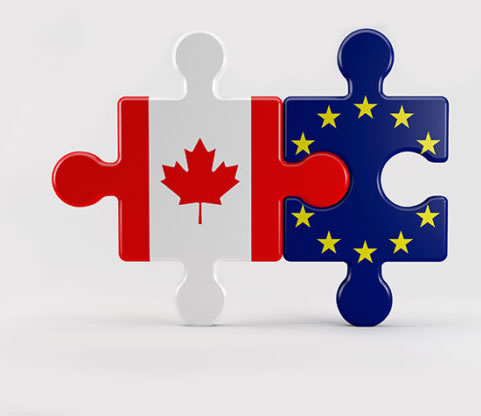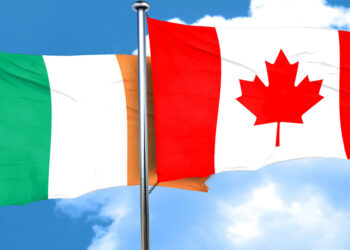CETA
CETA - what it means for Ireland, EU and Canada
The Canada-EU Agreement will support increased investment into Ireland and give Irish SMEs easier access to a sophisticated, hi-income market. These are trade imperatives we must continue to act on in pursuit of a stable and prosperous future. CETA also opens up the Canadian public procurement market which, in tandem with the Canadian Federal Government’s recently announced multi-billion infrastructure investment programme, offers a means for Irish companies to diversify into new markets.
Minister Eoghan Murphy Montreal | 15 March 2017
An Overview of Government Procurement in Canada
by Office of Small and Medium Enterprises (OSME) – DOWNLOAD PRESENTATION
Bidding in Europe by Philip Lee, Partner Philip Lee – DOWNLOAD PRESENTATION
CETA is important for Ireland, given the considerable further trade potential between Ireland and Canada which we must exploit. We will see 98% of our bilateral trade liberalised by CETA which will give Irish and Canadian companies a huge boost and a huge competitive advantage in each other’s markets.
Charlie Flanagan, Minister for Foreign Affairs and Trade, ICBA Summit | 27 October 2016
On 30 October, the EU and Canada signed a trade agreement, known as the Comprehensive Economic and Trade Agreement (CETA).
In short CETA will make business with Canada easier, remove customs duties, substantially improve access to public contracts, open up new sectors of the Canadian services market, offer predictable conditions for investors, and protect Geographical Indications.
Address by the Honourable François-Philippe Champagne,
Minister of International Trade, to mark and celebrate the provisional application of CETA on 21 September.
The Next Steps
On 23 January 2017, the EU Committee of International Trade held its final discussion on CETA. Members discussed the details around the powers of the Joint Committee to be set up by the agreement and appointment of judges for the CETA Investment Court. INTA Members decided to give consent to CETA.
Provisional application, once an agreement has been approved by Member States in the Council and by the European Parliament, allows European businesses and consumers to immediately derive benefits from the agreement.
Along with the CETA documentation , the EU and Canada have signed a Joint Interpretative Instrument a document that will have legal force and that will further clarify, in a clear and unambiguous way, what Canada and the European Union have agreed in a number of CETA articles (like on the new Investment Court System, on the right to regulate, on public services or on labour and environmental protection).
The ICBA urges the Irish Government to ratify CETA.

The Facts
Cutting tariffs
CETA will deliver real benefits to Irish companies by getting rid of 99% of tariffs, in most cases as soon as the deal comes into effect. As of the first day of its implementation, Canada will eliminate duties worth €400 million for goods originating in the EU.
Greater choice
Opening markets also has the potential to keep prices down and provide Irish consumers with more choice. EU standards that protect people’s health and safety, social rights, their rights as consumers will remain untouched. Reversely imports from Canada will have to satisfy all EU product rules and regulations – without exception. This means that CETA will not change the way the EU regulates food safety, including on GMO products or the ban on hormone-treated beef.
Opening up the Canadian services market
CETA is the most progressive agreement ever concluded by the EU in the area of services and investment. With their European counterparts Irish firms will have advantages when it comes to getting investment projects approved in Canada. All European firms will also have more opportunities to provide services, for example, specialised maritime services like dredging, moving empty containers, or shipping certain cargo within Canada. In other service sectors, such as environmental services, telecom and finance, market access is ensured, both at federal level and – for the first time – provincial level. In CETA – as in all its trade agreements – the EU fully protects public services.
Mutual recognition of professional qualifications
CETA gives an initial framework for mutual recognition of qualifications in regulated professions such as architects, accountants and engineers. The relevant professional organisations in the EU and Canada will have to jointly work out the technical details of recognition of their respective qualifications on the basis of the framework. The competent authorities in Canada and the EU will then approve their work and give it legal effect.
Fewer work travel restrictions
CETA will make it easier for Irish company staff to move temporarily between the EU and Canada. This will help European companies run their operations in Canada. It will be also easier for other professionals to temporarily supply legal, accounting, architectural or similar services. After–sales service will now be a deliverable. Irish firms who export equipment, machinery and software can send maintenance engineers and other specialists to provide after-sales and related services and support.
Giving EU firms unprecedented access to government tenders provincially and federally.
Canada has opened up its government tenders to EU companies to a greater extent than with any of its other trading partners. Irish and EU firms will be able to bid to provide goods and services not only at the federal level but also to Canadian provinces and municipalities – the first non-Canadian firms to be able to do so.
Canada’s provincial procurement market is estimated to be double the size of its federal equivalent. Canada has also agreed to step up transparency by publishing all its public tenders in a single procurement website.
Mutual conformity
Companies in several sectors will also benefit from the gains derived from the elimination of double testing.EU and Canada have agreed to accept each other’s conformity assessment certificates in areas such as electrical goods, electronic and radio equipment, toys, machinery or measuring equipment. This means that, under certain circumstances, a conformity assessment body in the EU can test EU products for export to Canada according to Canadian rules and vice versa. This will avoid both sides doing the same test and could greatly reduce costs for companies and consumers alike. This is of particular benefit to smaller companies for whom paying twice for the same test can be prohibitive.
A reformed system of investment protection
CETA ensures protection for investments while enshrining the right of governments to regulate in the public interest, including when such regulations affect a foreign investment. The traditional form of investor-state dispute settlement that exists in many trade agreements negotiated by Member States (known as ISDS) has been replaced with a new and improved Investment Court System (ICS).
The new mechanism will be a public one – not based on ad hoc tribunals. It will have professional and independent judges appointed by the EU and Canada and held to the highest ethical standards through a strict code of conduct. Its procedures will be transparent, including by opening up hearings and publishing documents submitted during cases. The investment provisions narrow down the cases when an investor can challenge a State, and afford no protection for so-called shell or mailbox companies – only companies with a real economic link are eligible. In no case may a public entity be forced to change a piece of legislation or pay punitive damages.
The reformed ICS is a new feature of trade agreements, and the relevant public debate is not finalised in many Member States. Therefore, the choice of Member States, supported by the Commission, is that ICS will be out of the scope of provisional application of CETA, meaning that it will only be implemented once all Member States conclude their national ratification procedures. During that time, as foreseen in the agreement, the Commission will work with Canada to further elaborate certain parameters of the new system, like the selection of judges, the access by small and medium enterprises to the new system and the appeal mechanism.
New opportunities for farmers and food producers
CETA will create new opportunities for farmers and food producers, while fully protecting the sensitivities of the EU. The EU’s openings on certain products are limited and calibrated and are balanced out by Canadian openings that satisfy important European exporting interests, such as cheese, wine and spirits, fruit and vegetables, processed products and geographical indications. All imports from Canada have to satisfy EU rules and regulations. For example, only hormone-free meat will ever be imported into the EU.
CETA is also an important step forward for many medium-sized and smaller businesses in rural communities trading in agricultural products. They will now benefit from Canada agreeing to protect 143 distinctive products from specific geographical regions in the EU. The products which will be protected in CETA are the most exported EU food and drink products ranging from Roquefort cheese, to balsamic vinegar from Modena and Dutch Gouda cheese. European products will be protected from imitations at a level comparable to EU law and will avoid the risk of being considered generic in Canada.
Intellectual Property Rights
CETA will create a more level playing field between Canada and the EU in the area of Intellectual Property Rights (IPR). It will strengthen the protection of copyrights by aligning Canadian rules with those of the EU on protection of technological measures and digital rights management. It will also improve how Canada’s IPR system protects patents for EU pharmaceutical products. It will also bolster enforcement by foreseeing the possibility of provisional measures and injunctions for intermediaries involved in infringing activities. Canada also agreed to strengthen its border measures against counterfeit trademark goods, pirated copyright goods and counterfeit geographical indication goods.
The Ireland Canada Business Association credits the European Commission of the European Union for the information supplied on CETA.





